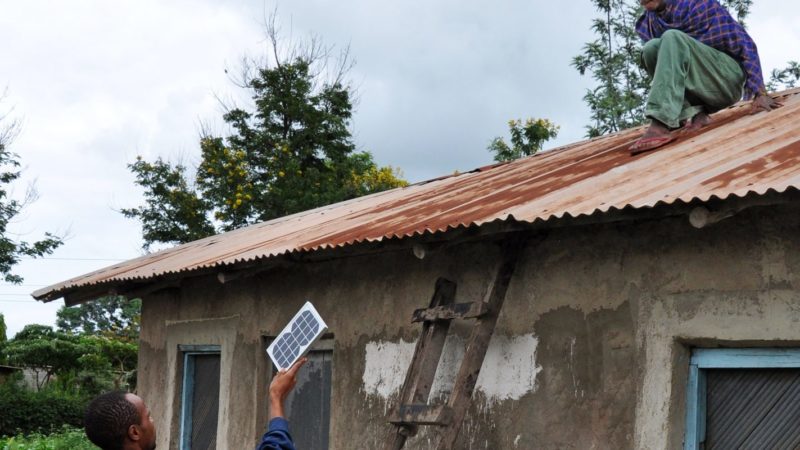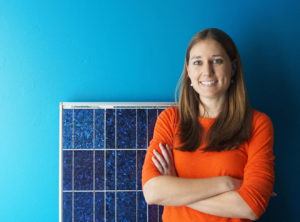
Making solar power affordable in developing countries
by Lesley Marincola, 2017 Pritzker Emerging Environmental Genius Award finalist
Globally, over 1 billion people are still not connected to the grid. Every year, this consumer base burns over $30 Billion (USD) of their hard-earned income on candles, disposable batteries and kerosene to meet their energy needs. These energy sources are expensive, inefficient and hazardous. This is the 21st century, yet more than a billion people still rely on lighting sources from the 1800s.
The technology exists to solve this problem. Solar panels, LED lights and long-life rechargeable batteries can be combined into rugged products that will be the end of kerosene once and for all. Solar energy is clean, more versatile and more cost-effective than these incumbent solutions.
For the 1.2 billion off-grid people, there’s a barrier to accessing these solar products: the barrier of upfront cost. A typical off-grid family in the developing world will simply never have enough cash in hand at one time to be able to buy a solar home system outright. But if you can spread the cost of a solar product out over time such that each weekly payment costs less than what that family would have spent on kerosene, then you can unlock the purchasing power of a billion people.
Angaza has developed a technology platform that makes life-changing products like solar home systems affordable to anyone through flexible payment plans. Angaza’s Pay-As-You-Go platform allows off-grid consumers to purchase solar energy in small amounts over time to fit their typical cash flow. Off-grid homes and businesses can now pay less than $1 a week to access clean, reliable solar lighting and charging.

First, Angaza works with manufacturers to embed metering technology inside of solar home systems. When a customer pre-pays for energy, the product is activated. Once payment runs out, the product automatically deactivates to ensure the customer pays again. This embedded metering technology gives distributors the confidence to extend financing to off-grid consumers who may have no formal credit history. Angaza also provides distributors with the software to scale fast-growing Pay-As-You-Go operations. Their web platform and mobile app enable distributors to digitize consumer information, track payments in real time, wirelessly communicate with deployed solar home systems and analyze trends in their loan portfolios. These tools allow distributors to access a vast, untapped market of customers by dropping the upfront price of solar devices and collecting payments over time.
The social and health benefits of replacing kerosene with clean solar energy are numerous. Transitioning to solar enables an off-grid family to save up to 20% of their income and dramatically increase household health. The World Bank estimates that burning kerosene for light is equivalent to smoking 2 packs of cigarettes each day, and these effects are often felt most severely by children using kerosene to read and study. Each year, over 4 million people in developing countries die prematurely from illnesses related to indoor air pollution, including kerosene lighting.
Distributed solar also has a profound impact on combating climate change by reducing CO2 and black carbon emissions from kerosene lamps. A typical kerosene lantern releases 100 kg of CO2 per year into the atmosphere. Over 20 billion liters of kerosene are burned each year for off-grid lighting, and almost 10% of this amount is converted into black carbon, or particulates that absorb light and heat the atmosphere, which is a major contributor to global warming. Experts estimate that the impact of black carbon emissions on climate change may be 5-15 times worse than CO2. Solar energy in off-grid homes can immediately counteract these effects on climate change, as long as it’s made affordable to kerosene-dependent users so it can scale as a global solution.
By removing that upfront cost barrier, Angaza’s PAYG financing technology has quadrupled the rate that distributors can transition off-grid families to solar. Angaza has now enabled over 1 million people, across 20 countries throughout Sub-Saharan Africa, Asia, and Latin America, to cease kerosene purchases and adopt clean, reliable solar energy.
